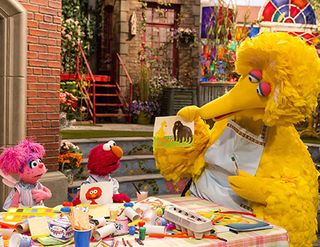Does 'Sesame Street' Still Matter?

Representing one of the more peculiar TV stories of the young year, Sesame Street shifts to HBO Jan. 16, for season 46 and beyond, sparking a minor controversy about whether the iconic kids show belongs, as if in a public trust, on free TV. But in the age of a million and one media choices, where a toddler is almost as familiar with an iPad as he or she is with a sippy cup, does Sesame Street still matter?
Perhaps not in the way it did four decades ago, says Michael Davis, author of Street Gang: The Complete History of Sesame Street. But the program remains both a cultural touchpoint and a vital educational tool, he believes. Elmo, love him or—more likely—loathe him, shows Sesame’s ability to adapt and mint new characters who resonate with children. And classic characters such as Cookie Monster and Grover continue to entertain, and to educate.
“Sesame Street does still matter in a big way,” says Davis, even in what he calls “the golden age” of children’s programming.
HBO: Everything’s A-OK
Much has been made of the new Sesame Street season: Half-hour episodes, down from an hour. A new opening sequence, shot at its Kaufman Astoria Studios (New York) base for the first time. New characters and a new set, and more of a focus on a smaller number of puppets. “Season 46 has more changes than we’ve ever launched in one season,” says Carol-Lynn Parente, senior VP of Sesame Workshop and executive producer, Sesame Street, taking a break from the writing of season 47.
Every episode will be centered around a lone topic relevant to kids. And the shorter episode length reflects a decreased reliance on the stock content that used to round out the hour.
HBO hasn’t given many notes, says Parente. “They really have left the creative total to us,” she says. “It’s a nice vote of confidence in what we’re doing.”
New episodes migrate to PBS nine months after they debut on HBO. Parente says the HBO partnership was essential for a “small, not for profit” outfit, Sesame Workshop, which had been losing a lot of money. The promotional heft of the premium cable giant, she says, is something PBS could not match.
Davis sees the HBO shift as a smart one for Sesame Workshop that ultimately benefits viewers. “It’s a new and needed revenue source,” he says, for a show that relies heavily on expensive research.
“It’s so important for the success of the show, the continuity of the show,” says Davis. “It takes a pile of cash to do that kind of work.”
Kids who don’t have HBO won’t notice that they’re getting their Sesame episodes nine months late, believes Davis. Plenty of Sesame content is available at the local library and on demand, and viewers in Sesame’s target demo find comfort in repeats. “I don’t believe this takes anything away from PBS,” says Davis. “It’s hard for me to make the argument that anybody is really being denied anything.”
‘Count’ Me In
Gen X’ers, and others, can still call up Sesame bits and songs from our childhood, whether it’s the exasperating elusiveness of Snuffleupagus, the animated diva singing the virtues of “11” from atop a pigsty fence, or the “Beetles” singing “Letter B”. I don’t know that kids today feel the same way. I asked my own offspring, ages 10 and 7, this morning, if they remembered Sesame Street, and got a couple shrugs. My wife reminded me that our 7-year old daughter loved the “Elmo’s World” segments in Sesame, but preferred Dora the Explorer on Nick Jr. and Mickey’s Clubhouse on Disney Jr. My son, meanwhile, loved PBS Kids’ Dinosaur Train and a Brit import called Roary the Racing Car that he watched on demand on his grandparents’ Comcast system.
“I remember Oscar the Grouch,” my son said. “He was grouchy.”
I started singing the theme song, and fortunately was able to stop halfway through, when a smile of recognition came across my daughter’s face.
“They had other options,” said my wife.
Davis notes that the prime age of Sesame, around 2 or 3, may be too young to fully remember the show.
The kids programming world is every bit as competitive as the grown up one, he adds. “I don’t envy PBS being in that marketplace,” says Davis. “They need to fight for their share of audience from a group of people who can’t even spell audience. There’s so much money to be made, domestically and internationally.”
He’s awaiting the new season, just like the rest of us, but is pleased to hear that some urban grit has been restored to Sesame Street. “It was too shiny and colorful,” he says. “When it debuted, it was meant to be a neighborhood that looks like Harlem.”
‘Sesame’ Seeds
Another key, and somewhat overlooked, aspect of the five-year HBO deal—Sesame Workshop will launch a Sesame spinoff, aiming for fall 2017, and a second concept, described as “a new original educational series,” which may or may not count Sesame as a forebear.
“It’s exciting to be talking about something brand new,” says Parente, who adds, “there’s a lot going on—it’s a busy street!”
Broadcasting & Cable Newsletter
The smarter way to stay on top of broadcasting and cable industry. Sign up below
Michael Malone, senior content producer at B+C/Multichannel News, covers network programming, including entertainment, news and sports on broadcast, cable and streaming; and local broadcast television. He hosts the podcasts Busted Pilot, about what’s new in television, and Series Business, a chat with the creator of a new program, and writes the column “The Watchman.” He joined B+C in 2005. His journalism has also appeared in The New York Times, The Philadelphia Inquirer, Playboy and New York magazine.

